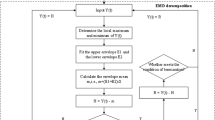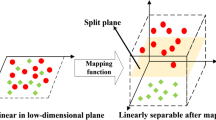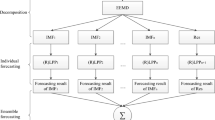Abstract
Energy consumption forecasting plays a vital role in rational energy and economic planning formulation for a country or an area around the world. A novel forecasting method based on error correction and decompose-ensemble strategy combined with linear regression model (LR) and triple exponential smoothing model (TESM) is proposed in this study. Firstly, original energy consumption is decomposed into the main trend subseries and non-stationary errors subseries by use of LR model. And the mainly trend subseries is forecasted by LR. Then, the non-stationary subseries (forecasting errors of LR) is decomposed into several intrinsic mode functions (high-frequency subseries, middle-frequency subseries and low-frequency subseries) and residual subseries by empirical mode decomposition (EMD). With respect to their different dynamic changing features and influenced factors, each intrinsic mode functions subseries and residual subseries are forecasted, respectively by TESM. Finally, the prediction of energy consumption is obtained by summing the trend subseries prediction results and these errors subseries prediction results. Forecasting results prove that error correction is a useful strategy for improve the forecasting performance. Most of all, the origin complex errors correction forecasting problem has been resolved into some simple forecasting problem based on decompose-ensemble strategy, which have better forecasting performance, compared with individual models (LR, auto regression model (AR) and TESM), traditional error correction method, combination models (which is developed by using of LR, AR and TESM based on equal weight method, entropy weight method and optimal weight method). The proposed novel method can provide accurate and reliable forecasting results, which is a feasible forecasting approach for China’s annual energy consumption. By use of the proposed forecasting method considering error correction based on EMD decompose-ensemble strategy combined with LR and TESM, China’s energy consumption in 2021 will increase to 484,555.30 ten thousand standard tons coal equivalent (tce), and the average annual growth of the coming 5 years is 2.135%. Since China’s energy consumption is still on its growing process, China should pay more attention to change its economic development model from energy-intensive economy to low-carbon economy.









Similar content being viewed by others
References
Kankal, M., Akpınar, A., Kömürcü, M.I., et al.: Modeling and forecasting of Turkey’s energy consumption using socio-economic and demographic variables. Appl. Energy 88, 1927–1939 (2011)
Utgikar, V.P., Scott, J.P.: Energy forecasting: predictions, reality and analysis of causes of error. Energy Policy 34, 3087–3092 (2006)
Lee, Y.S., Tong, L.I.: Forecasting energy consumption using a grey model improved by incorporating genetic programming. Energy Convers. Manage. 52, 47–152 (2011)
Yu, S., Wei, Y.M., Ke, W.: China’s primary energy demands in 2020: predictions from an MPSO–RBF estimation model. Energy Convers. Manage. 61, 59–66 (2012)
Fattaheian-Dehkordi, S., Fereidunian, A., Gholami-Dehkordi, H., Lesani, H.: Hour-ahead demand forecasting in smart grid using support vector regression (SVR). Int. Trans. Electr. Energy Syst 24, 1650–1663 (2014)
Gürbüz, F., Öztürk, C., Pardalos, P.: Prediction of electricity energy consumption of Turkey via artificial bee colony: a case study. Energy Syst 4, 289–300 (2013)
Yuan, C., Liu, S., Fang, Z.: Comparison of China’s primary energy consumption forecasting by using ARIMA (the autoregressive integrated moving average) model and GM(1,1) model. Energy 100, 384–390 (2016)
Xie, N.M., Yuan, C.Q., Yang, Y.J.: Forecasting China’s energy demand and self-sufficiency rate by grey forecasting model and Markov model. Int. J. Electr. Power Energy Syst. 66, 1–8 (2015)
Oğcu, G., Demirel, O.F., Zaim, S.: Forecasting electricity consumption with neural networks and support vector regression. Proc. Soc. Behav. Sci. 58, 1576–1585 (2012)
Barak, S., Sadegh, S.S.: Forecasting energy consumption using ensemble ARIMA–ANFIS hybrid algorithm. Int. J. Electr. Power Energy Syst. 82, 92–104 (2016)
Lee, Y.S., Tong, L.I.: Forecasting nonlinear time series of energy consumption using a hybrid dynamic model. Appl. Energy 94, 251–256 (2012)
Zhou, C., Chen, X.Y.: Adaptive combination forecasting model based on area correlation degree with application to China’s energy consumption. J. Appl. Math. 1–12 (2014)
Yu, S., Wei, Y.M., Wang, K.: A PSO–GA optimal model to estimate primary energy demand of China. Energy Policy 42, 329–340 (2012)
Atsalakis, G., Frantzis, D., Zopounidis, C.: Energy’s exports forecasting by a neuro-fuzzy controller. Energy Syst 6, 249–267 (2015)
Liua, X., Cuartas, B.M., Muñiz, A.S.G.: A Grey neural network and input-output combined forecasting model. Primary energy consumption forecasts in Spanish Economic sectors. Energy 115, 1042–1054 (2016)
Karimi, H., Dastranj, J.: Artificial neural network-based genetic algorithm to predict natural gas consumption. Energy Syst 5, 571–581 (2014)
Chai, J., Guo, J., Lu, H.: Forecasting energy demand of China using Bayesian Combination model. China Popul. Resour. Environ. 18, 50–55 (2008)
Seok, J.H., Kim, J.J., Lee, J.Y., et al.: Abnormal data refinement and error percentage correction methods for effective short-term hourly water demand forecasting. Int. J. Control Autom. Syst. 12, 1245–1256 (2014)
Chen, M., Yuan, J., Liu, D., et al.: An adaption scheduling based on dynamic weighted random forests for load demand forecasting. J. Supercomput. 1–19 (2017)
Li, G.L., Cai, Z.H., Kang, X.J., Wu, Z.D., Wang, Y.Z.: ESPSA: a prediction-based algorithmfor streaming time series segmentation. Expert Syst. Appl. 41, 6098–6105 (2014)
Bindiu, R., Chindri, M., Pop, G.V.: Day-ahead load forecasting using exponential smoothing. Sci. Bull. Petru Maior Univ. Tirgu Mures 6, 89–93 (2009)
Ma, X., Hu, J., Zhang, L.: EMD-based online filtering of process data. Control Eng. Pract. 62, 79–91 (2017)
Wei, L.Y.: A hybrid ANFIS model based on empirical mode decomposition for stock time series forecasting. Appl. Soft Comput. 42, 368–376 (2016)
Kopsinis, Y., Mclaughlin, S.: Development of EMD-based denoising methods inspired by wavelet thresholding. IEEE Trans. Signal Process. 57(4), 1351–1362 (2009)
Acknowledgements
This work is supported by Humanity and Social Science Youth foundation of Ministry of Education of China (Grant no. 16YJC630178).
Author information
Authors and Affiliations
Corresponding author
Ethics declarations
Conflict of interest
The authors declare no conflict of interest. The founding sponsors had no role in the design of the study; in the collection, analyses, or interpretation of data; in the writing of the manuscript, and in the decision to publish the results”.
Rights and permissions
About this article
Cite this article
Zhou, C., Chen, X. China’s energy consumption prediction considering error correction based on decompose–ensemble method. Energy Syst 10, 967–984 (2019). https://doi.org/10.1007/s12667-018-0300-1
Received:
Accepted:
Published:
Issue Date:
DOI: https://doi.org/10.1007/s12667-018-0300-1




